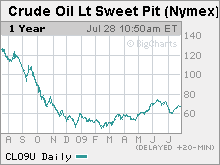Oil settles below $68
Investors shy away from risky commodities and stocks after a report shows consumer confidence was weaker-than-expected in July.
NEW YORK (Reuters) -- Oil prices fell Tuesday after data showing a drop in U.S. consumer confidence spurred concerns about the economy and sent investors into safer havens.
An index of U.S. consumer confidence dropped to 46.6 in July from 49.3 in June, below analyst expectations of 49.0, recording its second consecutive decline as sentiment remained hampered by a difficult job market.
The decline in sentiment, as well as disappointing corporate earnings results, pushed stock markets lower, while the dollar and the yen gained as investors dumped riskier assets.
U.S. crude settled down $1.15 at $67.23 a barrel.
"The petroleum markets are backing off from the highs, seemingly prepared, along with the S&P 500, to at least take a break from the recent rally," said Tim Evans, analyst at Citi Futures Perspective in New York.
Optimism that a turnaround in the global economy could lift slumping fuel demand has supported crude prices this year. Crude fell from record highs near $150 a barrel last July to below $33 a barrel in December as the recession battered world consumption.
A Reuters poll of analysts forecast oil prices will average $73 a barrel next year, up from an average 2009 price prediction of $58.23 a barrel.
The chief executive of Saudi Aramco, the state oil company of OPEC kingpin Saudi Arabia, expressed confidence the global fall in oil demand was temporary and that consumption growth would eventually resume.
Leading U.S. refiner Valero Energy Corp. (VLO, Fortune 500) said it would run its 16 plants at 78% of capacity in the third quarter, however. Weak demand has hit profits for refiners, causing them to throttle back on output.
The wild swings in oil prices have pushed the U.S. Commodity Futures Trading Commission to consider setting position limits for crude and other finite commodities.
Officials from Intercontinental Exchange Inc. told the CFTC in a testimony that volatility and price distortions could increase unless new measures are thoroughly vetted.
Investors were also awaiting U.S. weekly oil inventories data from the American Petroleum Institute due out late Tuesday and data from the U.S. Energy Information Administration data due out on Wednesday.
An expanded poll of analysts by Reuters forecast the reports would show a 1.3 million barrel drop in crude stocks for the week to July 24. Gasoline stocks were seen rising by 400,000 barrels and distillate stocks were forecast up by 1.3 million barrels. ![]()


